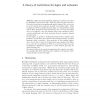Free Online Productivity Tools
i2Speak
i2Symbol
i2OCR
iTex2Img
iWeb2Print
iWeb2Shot
i2Type
iPdf2Split
iPdf2Merge
i2Bopomofo
i2Arabic
i2Style
i2Image
i2PDF
iLatex2Rtf
Sci2ools
109
click to vote
CAV
1999
Springer
1999
Springer
A Theory of Restrictions for Logics and Automata
BDDs and their algorithms implement a decision procedure for Quanti ed Propositional Logic. BDDs are a kind of acyclic automata. Unrestricted automata (recognizing unbounded strings ofbit vectors) can be used to decide more expressive monadic second-order logics. Prime examples are WS1S, a number-theoretic logic, or a string-based notation such as those proposed in some introductory texts. It is not clear which one is to be preferred. Also, the inclusion of rst-order variables in either version is problematic since their automata-theoretic semantics depends on restrictions. In this paper, we provide a mathematical framework to address these problems. We introduce three and six-valued characterizations of regular languages under restrictions. From properties of the resulting congruences, we are able to carry out detailed state space analyses that allows us to solve the two problems in WS1S in a way that require no extra normalization calculations compared to a naive decision procedure f...
Related Content
| Added | 03 Aug 2010 |
| Updated | 03 Aug 2010 |
| Type | Conference |
| Year | 1999 |
| Where | CAV |
| Authors | Nils Klarlund |
Comments (0)

